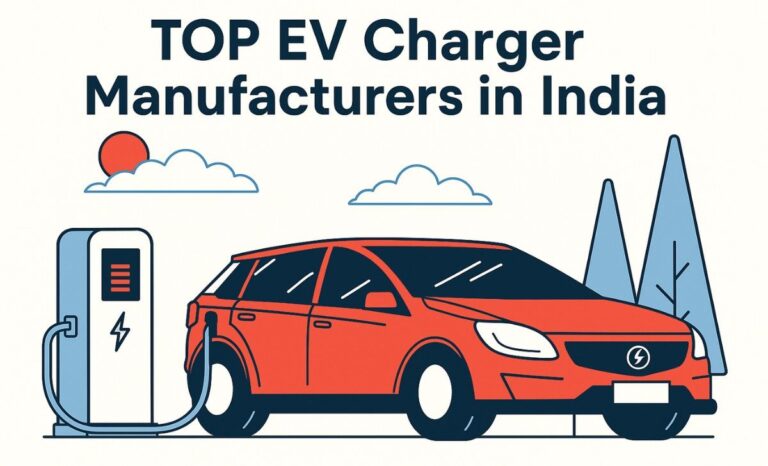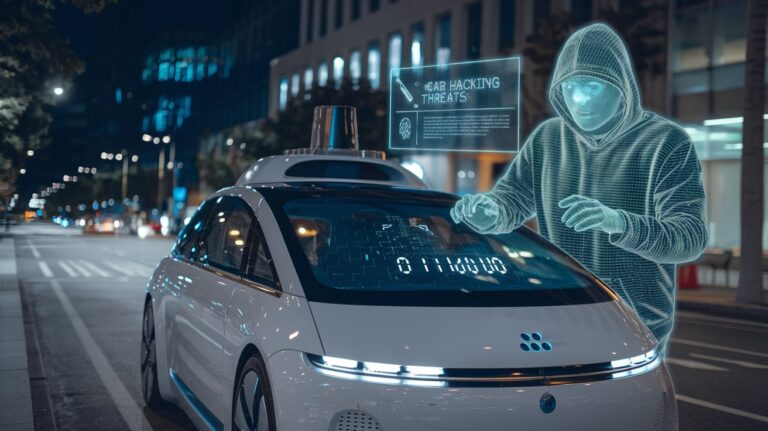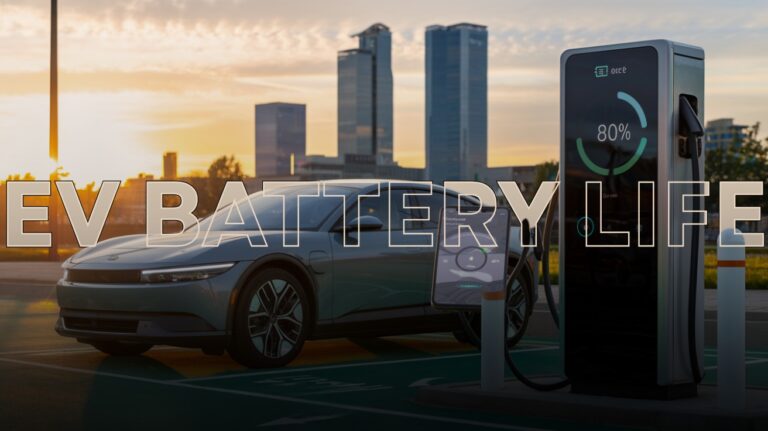Unforgettable Automotive Moments: India 2023 Headlines
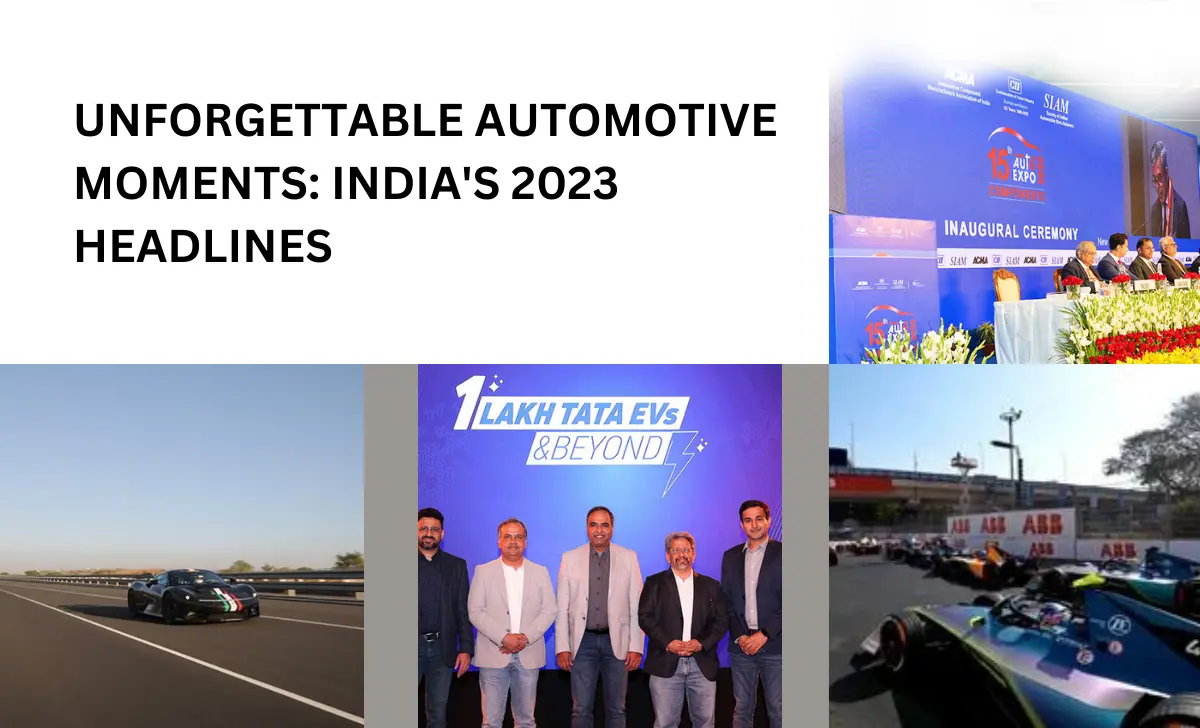
The Indian auto sector saw plenty of action in 2023. The biennial Auto Expo returned after a pandemic gap. Carmakers launched new models, struck deals, and hit sales records. Regulations also pushed for cleaner emissions and improved safety.
Maruti Suzuki crossed total sales of 25 million vehicles in its 40-year journey. This includes 5 million units in just the last 4 years – showing accelerating demand. Tata Motors also hit a milestone by selling over 1 lakh electric cars and SUVs so far.
New “real world” emission rules led brands like Honda and VW to stop some diesel models. But companies like Tata and MG teamed up with local partners for their India EV plans. Toyota, Renault, and others will launch new models on their flexible platforms too.
The year closed with Formula E racing in Hyderabad to showcase electric performance. But rising winter pollution also resulted in bans on older BS3 and BS4 diesel vehicles in the Delhi region.
2023 Highlights:
So 2023 was an eventful year for the Indian auto industry on multiple fronts – new launches, partnerships, policy changes, and technology shifts.
Auto Expo 2023 Highlights:
- The event marked the return after COVID-19 hiatus, though its impact was modest.
- Notable showcases included Maruti’s eVX concept and the global premiere of the Jimny 5-door.
- Tata revealed the Sierra and Harrier EV concepts in a promising 5-door style nearing production.
- Hyundai and Kia introduced Ioniq models, and purpose-built Carens MPVs, while Lexus debuted various luxury vehicles and EV concepts.
- Toyota highlighted alternative fuel tech, MG launched updated SUVs with hybrid options, and BYD showcased three electric models.
Key Displays Summary:
- Auto Expo 2023 displayed various innovative concepts and promising future developments in the automotive industry.
- Maruti, Tata, Hyundai, Kia, Lexus, Toyota, MG, and BYD presented a diverse range of vehicles, hinting at exciting advancements and trends in the market.
Overall Impressions:
- Despite not making a huge impact, the Expo featured intriguing showcases, sparking anticipation for the evolution of these concepts and models in the coming years.
Maruti Suzuki’s Milestone Achievement:
- Maruti Suzuki marks a historic milestone, selling 25 million cars and SUVs, a first for an Indian manufacturer.
- Achieving this feat 40 years after introducing the Maruti 800 in December 1983 showcases the company’s journey.
- Progress: 5 million in 23 years, the next 5 million in six years, then seven years to reach 20 million, and the recent 5 million in just four years, highlighting rapid recent growth.
- Congratulations to Maruti Suzuki on this milestone; we anticipate their continued success ahead.
Pininfarina Battista’s Speed Record:
- We aimed to break our previous speed record at India’s NATRAX oval track.
- Using a 1,900hp Pininfarina Battista, Hormazd Sorabjee hit 358.03kph, surpassing our earlier record.
- Renuka Kirpalani achieved 357.10kph, becoming India’s fastest woman driver.
- The Battista set new world records, reaching 0-300kph in 10.49 seconds and covering a quarter-mile in 8.55 seconds.
- It also holds India’s highest EV top speed, adding to its impressive accolades as a leading supercar.
Implementation of Real Driving Emission (RDE) Norms:
- April 2023 marked the enforcement of RDE norms under BS6 Phase II in India.
- These norms demand vehicles meet emission targets in real-world scenarios, unlike lab-based tests.
- Compliance required costly engine upgrades, leading to the discontinuation of certain car models.
- Honda ceased diesel cars, Jazz, and City Gen-4; Maruti Suzuki ended the Alto 800 with its iconic F8D engine.
- Skoda discontinued slow-selling Octavia and Superb sedans, among others.
- RDE norms had a significant impact, prompting extensive changes in engines and models for compliance.
Tata Motors’ EV Milestone:
- Tata Motors celebrates selling 1,00,000 EVs within five years, with a significant sales progression.
- Sales timeline: First 10,000 in 44 months, the next 40,000 in 15 months, and the last 50,000 in just nine months.
- Securing an 85% market share, the Tiago EV emerged as India’s top-selling EV within a year, with over 19,000 units sold since January 2023.
- This achievement showcases Tata Motors’ commitment to pioneering sustainability and innovation in the EV sector.
Renault’s Revitalization in India:
- Renault unveils a new modular platform for global expansion, starting with Latin America, followed by Turkey, Morocco, and India.
- The platform, adaptable to lengths of 4-5 meters and various wheelbases (2.6-3.0 meters), is designed for models like the Duster.
- It accommodates diverse powertrains – ICE, flex-fuel, LPG, 48V hybrid, and full-hybrid, offering two- and four-wheel-drive options.
- This cost-effective platform empowers Renault to develop new products, aiming to enhance its market share in India.
- Renault is staging a strong comeback, crossing $1 billion turnover in FY2023, driven by a better product mix, cost improvements, increased exports, and favorable exchange rates.
- With the new platform, Renault plans to expand its product portfolio, intensifying competition in the Indian market.
SAIC Motor and JSW Group Joint Venture:
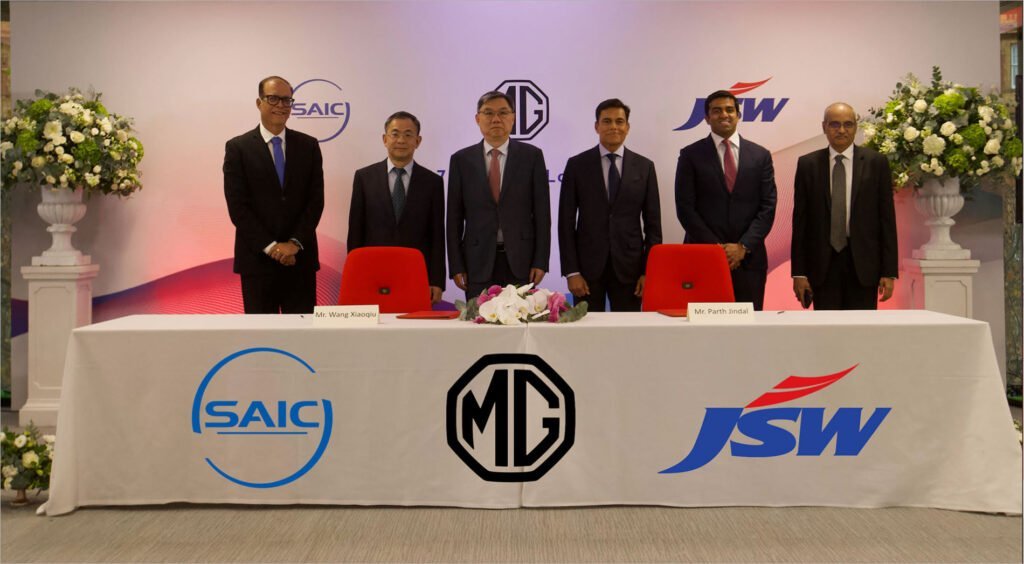
- SAIC Motor and JSW Group have formed a strategic joint venture, acquiring a majority stake in MG Motor India.
- The goal is to expand MG Motor’s operations in India, emphasizing a commitment to green mobility.
- JSW Group now holds a 35% stake in the Indian joint venture operations.
Background and Decision:
- MG Motor India, owned by SAIC Motor, faced challenges securing funding from its Chinese parent company.
- To address this, the company opted to divest a majority stake to Indian investors, with the deal valuation undisclosed.
Future Plans for MG Motor India:
- MG Motor India aims to diversify its vehicle range, with a strong emphasis on “New Energy Vehicles” or green mobility.
- While expanding the internal combustion lineup, the primary focus will be on advancing green and sustainable mobility.
Toyota’s Expansion in Bidadi:
- Toyota signed an MoU with Karnataka for a new manufacturing plant near Bengaluru in Bidadi.
- The plant, with a Rs 3,300 crore investment, will boost Toyota’s capacity by 1 lakh units annually, creating 2,000 jobs.
- Existing plants produce 4 lakh units yearly; the new plant adds a 30% capacity increase and is set to operate by 2026.
- It will be the main production site for the upcoming three-row SUV (codenamed 340D), targeting an annual output of 60,000 units, likely launching in 2026.
- Toyota’s commitment to India’s automotive industry is evident, and we eagerly await the new SUV’s market debut.
Air Pollution Measures in Delhi NCR:
- Increased air pollution led to the Delhi government banning BS3 and BS4 petrol and diesel cars, with violators facing a Rs 20,000 fine.
- Entry restrictions were placed on non-essential trucks, allowing only CNG or electric ones, and a temporary ban on non-BS6-compliant diesel four-wheelers.
- These measures are part of the CAQM GRAP, aiming to improve air quality with graded response actions, including restrictions on construction.
- Government-imposed strict measures to combat vehicular emissions, banning BS3 petrol and BS4 diesel cars in Delhi NCR under GRAP III.
- Ongoing monitoring with fines for violators is integral to the larger plan to enhance air quality in the region.
Bharat NCAP Implementation and First Results:
- Bharat NCAP has now active since October 1, a collaboration between MoRTH and Global NCAP.
- The program assesses cars through frontal, side, and side pole impact tests, providing ratings displayed with a BNCAP logo and sticker.
- Nitin Gadkari notes over 30 testing requests, emphasizing the ministry’s broader focus on road engineering.
- December’s initial results reveal Tata Harrier and Safari both achieving a full 5-star rating, excelling in adult and child occupant protection.
- These outcomes indicate a positive step towards enhancing car safety standards in India through Bharat NCAP.
Formula E Triumph in Hyderabad:
- In February 2023, Hyderabad hosted its inaugural Formula E race, the Hyderabad E-Prix.
- This marked India’s return to hosting an FIA world championship race after a decade.
- The event showcased India’s readiness for large-scale motorsport events and highlighted the potential of electric mobility.
- Top global drivers competed on a street circuit, reaching speeds of up to 280 km/hr.
- Due to its success, the next Hyderabad E-Prix is scheduled for February 10, 2024, promising an increased audience and heightened interest in electric mobility and motorsports in the country.
- India’s hosting of MotoGP racing further solidifies its position as a potential hub for international motorsport events.
The year 2023 was thus pivotal for India’s car market. We saw exciting new models and partnerships centered around electric mobility. Brand milestones reflected the growth potential despite some shifts due to new emission rules.
Government policies like real-world pollution testing and safety ratings will improve the ownership experience. Special events like the Auto Expo, Formula E race, and global launches will also inspire more Indians to invest in personal vehicles.
Overall, the resilience, growth, and regulatory changes make the Indian auto industry future-ready. 2023 set the stage for newer technologies, sustainable mobility, and more robust manufacturing capabilities.
We now keenly await what 2024 holds for carmakers and customers! There will likely be more electric options, connected features, shared mobility, and commercial vehicles for last-mile logistics. India’s mobility revolution has been stalled by the pandemic – but 2023 signaled that the journey has resumed at full throttle!
The electric vehicle market in India is on the brink of a major transformation, with anticipated launches of innovative models by 2024. Our detailed analysis of Electric Cars Launching in India by 2024 delves into the specifics of these upcoming releases. This revolution is poised to reshape transportation norms in the country, as highlighted in our comprehensive guide to the Electric Car Revolution in India. These insights align seamlessly with the future-driving innovations we’ve been exploring in our article Future Driving Innovations.


